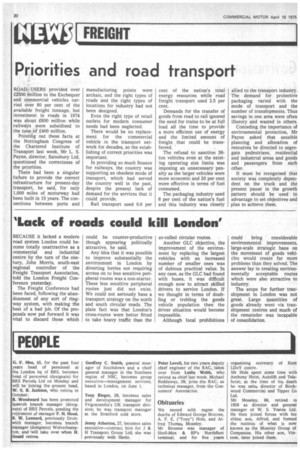'Lack of roads could kill London'
Page 22

If you've noticed an error in this article please click here to report it so we can fix it.
BECAUSE it lacked a modern road system London could become totally unattractive as a commercial and industrial centre by the turn of the century, John Morris, south-east regional controller of the Freight Transport Association, told the London Freight Conference yesterday.
The Freight Conference had been faced, following the abandonment of any sort of ringway system, with making the best of a bad job. Of the proposals now put forward it was vital to discard those which could be counter-productive though appearing politically attractive, he said.
Any idea that it was possible to improve substantially the environment in London by diverting lorries not requiring access on to less sensitive peripheral routes was a non-starter. These less sensitive peripheral routes just did not exist. We could not seriously base a transport strategy on the north and south circular roads. The plain fact was that London's cross-routes were better fitted to take heavy traffic than the so-called circular routes.
Another GLC objective, the improvement of the environment by replacing the largest vehicles with an increased number of smaller ones was of dubious practical value. In any case, as the GLC had found with buses, it was difficult enough now to attract skilled drivers to service London. If we thought in terms of doubling or trebling the goods vehicle population then the driver situation would become impossible.
Although local prohibitions could bring considerable environmental improvements, large-scale strategic bans on the movement of goods vehicles would create far more problems than they solved. The answer lay in creating environmentally acceptable routes which were also attractive to industry.
The scope for further transhipment in London was not great. Large quantities of goods already went via transhipment centres and much of the remainder was incapable of consolidation,








































































































































